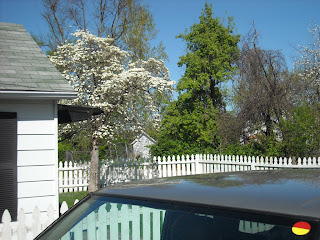In a previous post, I said I went three years without writing poetry, from the time I left Georgia until a recent open reading in Berea. That isn't true. After about a year in Kentucky, I wrote the poem below.
It's called APPALACHIAN PORTRAIT, and that pretty much describes it. It isn't "about" anyone in particular. Like many characters in my fiction, the poem depicts a composite of several folks I've met.
After living in the Kentucky hills a year or two, I wrote it while on vacation in Georgia. (Specifically, we were in Savannah visiting my lovely and charming stepdaughter.) I wonder if it was necessary to be geographically distant from my neighbors to write about them? Much of what I have written about a certain north Georgia cotton-mill town was penned after I left.
Anyway, here is the poem. Whatever its merits and demerits, I tried neither to romanticize my new locale, nor present it in caricature.
Appalachian Portrait
Chris McCrae stands alone on a hilltop.
His mother passed soon after Daddy ran off.
Now he's craggy and gray, cast in denim and leather,
the cuffs of his shirt stained with grease from his tractor,
his eye's like the sky's blue and white afternoon.
His long legs are bowed and his shoulders are hunched.
He doesn't know what he should do.
The bank note is due, and his wife's got the asthma.
His oldest smokes crank, and the baby has colic.
The neighbors are mad because the fences need mending
so his milk cow gets loose, and she grazes their garden.
The middle child stares as she plays Guitar Hero,
hollow eyes, no response as he asks about homework.
Chris stands alone on his twice-mortgaged hilltop.
His own mother passed after Daddy ran off.
He doesn't know what in the world he should do,
but he'll do it alongside the family.
(Grateful acknowledgment is made to BLUE COLLAR REVIEW, where this poem first appeared.)
My short story "I Am War, Mr. Tolstoy" published today
-
My short story "I Am War, Mr. Tolstoy" was published today on my author's
page at Cowboy Jamboree Press.
I pull from some personal shit on this one mor...
2 weeks ago






